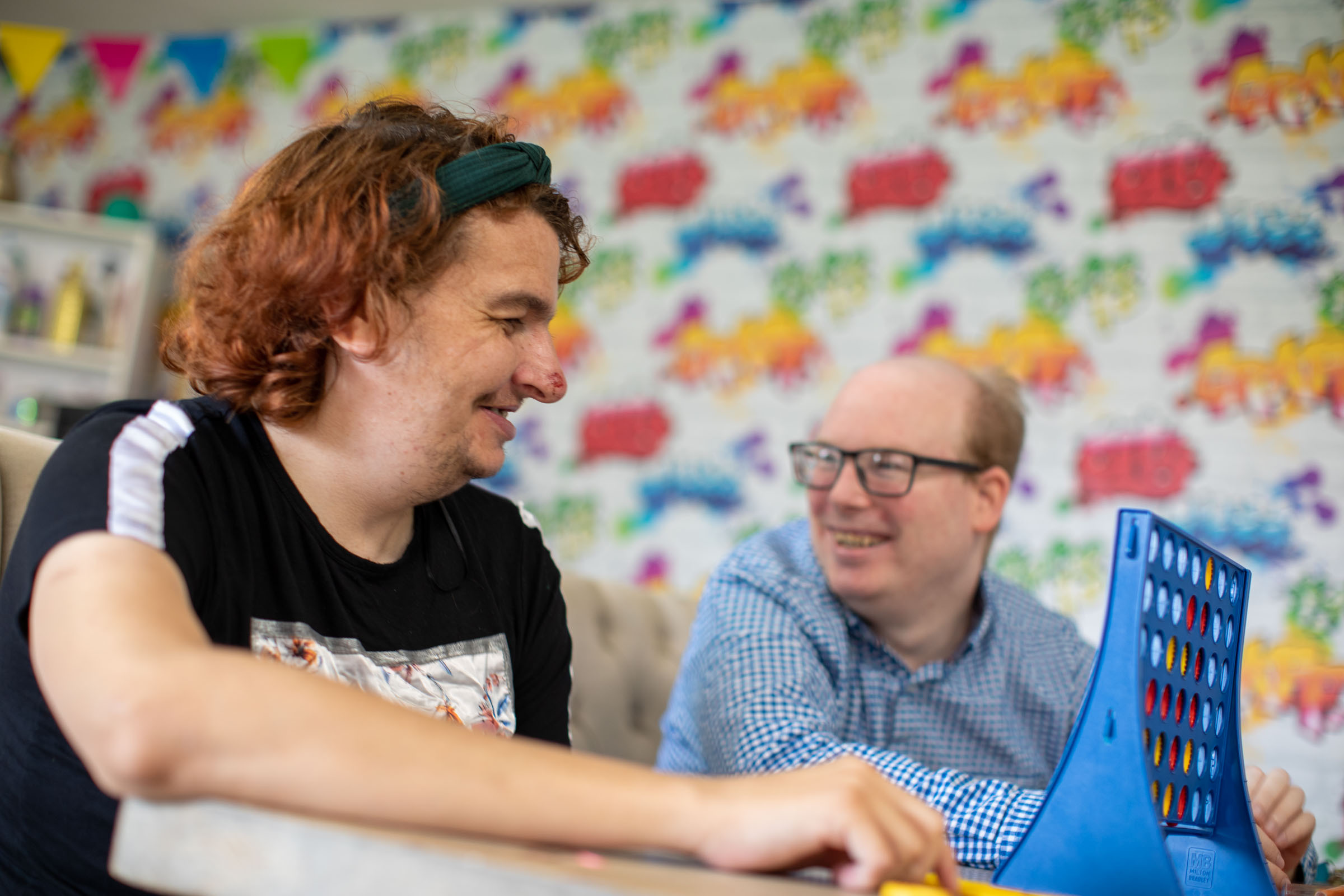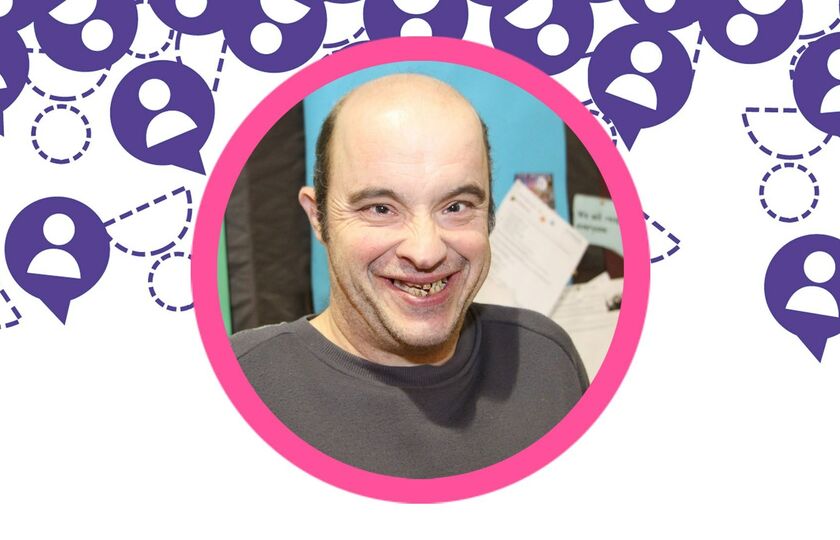CQC's guidance from social care staff - Relationships and sexuality in adult social care services
Supported Loving toolkit
Challenging values, attitudes and organisational culture

It may be necessary to challenge attitudes towards the relationships of people who access support.
This includes looking at the values of staff who are paid to support people, and the organisations who employ them.
The Human Rights Act 1998 respects every person's right to family life including, developing and maintaining personal relationships and consenting sexual relationships in private. This also includes support around sexuality and relationships (see our full toolkit page on rights). People accessing support can often require assistance in this area and access to friendships and relationships can be restricted. Restrictions are largely due to the beliefs, values and attitudes held by society as a whole and by those who are paid to support them. For example, there has been a belief that some people with learning disabilities and some autistic people do not have the same feelings and emotions as everyone else surrounding the desire for friendships or sexual relationships. Another incorrect belief is that older people are often no longer interested in sex or relationships. Such attitudes and beliefs can impact on the support people receive to develop and maintain their relationships. A review of the research literature Charitou, Quayle and Sutherland (2020) found that although staff wanted to support people with their sexual needs, and morally felt this was the right thing to do, they voiced cautious attitudes in this area. They felt it was risky and a challenge. This suggested sex and relationships were viewed in the context of risk and vulnerability.
Until 2019, the social care regulators the Care Quality Commission (CQC) had not provided any guidance on how organisations should support people regarding sexuality and/or personal relationships. The guidance CQC produced, explicitly states that social care providers need to recognise and support these needs, so that they do not risk discriminating against people or breaching their human rights. CQC believe that organisations must: “Understand the importance of enabling people to manage their sexuality needs. This includes making sure people have access to education and information to help them develop and maintain relationships and express their sexuality.”
CQC’s report Promoting Sexual Safety Through Empowerment (2020) examines sexual abuse in social care, highlighting how: “A culture must be developed where all people, including staff, feel empowered to talk about sexuality and raise concerns around safety where necessary.” The report found that many staff feel that sexuality remains “taboo” and feel uncomfortable discussing it. CQC believe that: “Effective adult social care leaders develop a culture, an environment, care planning and processes that keep people and staff safe, and support people’s sexuality and relationship needs.”
The Skills for Care Supporting Personal Relationships Guidance (2020) provides essential guidance for social care leaders on creating a culture, environment, and care planning processes that support people’s sexuality and relationships. Building on this, the Supporting Personal Relationships training pack helps staff reflect on how their values influence the support they provide. Together, these resources are key to ensuring people’s relationship needs are recognised and respected. See our Toolkit page on developing staff training for more details.
What are the most common challenges faced in this area and how best to support people to overcome them?
There are challenges facing people who use services, in terms of developing and maintaining relationships, which are a result of poor organisational culture. Such challenges include:
- Social isolation - Many people who access support are socially isolated and despite often living in close proximity to other people in their community, they are not connected to them. If organisations are not proactive in actively supporting the development and maintenance of relationships people can become (or remain) socially isolated. See our Toolkit page on supporting friendships for more information.
- People often need support to access activities and meet others - This means that they are unlikely to form relationships unless organisations have a proactive culture, that encourages their staff to support people to access activities in a variety of settings and make forming relationships with others a clear part of their role.
- Restrictive organisational policies - Such as not allowing overnight guests in people’s bedrooms or doors having to be left open, will not only reduce opportunities for people to have relationships but, may also lead people to become secretive and as result more vulnerable.
- Reduced opportunities to develop relationships - As a result of organisational cultures that are risk-averse and/or prioritise safeguarding without a corresponding balancing focus on people’s rights. This will be further exacerbated where staff are not trained to understand and uphold people’s rights. In turn, this will impact people’s knowledge and understanding of their rights, and their ability to challenge when these rights are not met or are restricted.
- Staff and others may not consider that people have the same need for relationships and fail to support their development and maintenance - They may make incorrect assumptions eg, that people are asexual or highly sexual, resulting in inappropriate support and/or restrictions. If organisations do not have training, which begins at induction and is supported with good policy and guidance, staff will be uncertain about how to proceed. This will make it more likely that they will act on their own values and attitudes. It will also increase inconsistency in the way that people are supported.
- There may be an imbalance between protecting the person and their rights where the person becomes overprotected with reduced access to their rights - This may be a result of organisational cultures that are risk-averse and/or prioritise safeguarding.
- Lack of access to relationships and sexuality education - People may have reduced access to sex education, information, and support because the organisation has not made it clear to staff that this is part of their role. They may have not received the necessary training and support for them to be able to provide this.
- Lack of privacy - This will occur where staff are not trained to understand that they are working in people’s homes and do not respect them as such. Staff who work in organisations with an institutional culture are more likely to fail to respect people’s privacy, for example, not knocking on people’s doors, entering people’s room without permission, opening people’s mail, and checking people’s phones.
- Communication barriers - This may mean that an individual's capacity to make their own decisions is underestimated. This will be increased where organisations lack good communication policies and training, where people do not have communication profiles, charts or passports and there is a failure to make information accessible.
- Not being able to talk about relationships and sexuality - Organisations with a culture of ignoring or re-directing conversations about relationships and/or sex, rather than making it part of everyday conversation, will restrict people’s opportunity to raise issues and limit the awareness of staff to peoples support needs. It will also mean that the topic remains a taboo.
Our beliefs and values about sex and sexuality are highly personal and subjective. They evolve over a long period of time of making sense of all the information we receive about sex, for ourselves. The fact that we all hold different values and attitudes further exacerbates the potential impact that this has on people’s support. As a result this may lead to one person or a group of people experiencing inconsistent support.
When providing support, it is important that we acknowledge the potential power imbalance between staff and the people we support, and the impact that this can have. If we don’t act as bridge-builders between the people we support and people they meet, it may be that their only relationships are with those who are paid to be in their lives. By not providing correct, accessible information about developing relationships, we may limit people’s lived experiences.
Watch CQC's presentation on how organisations can develop a positive culture regarding supporting positive relationships and sexuality.
Do...
- be open and non-judgmental when dealing with relationships and sexuality
- ensure that people have access to advocacy, if they need it, and to accessible information. Or raise issues on their behalf and uphold people’s rights to be heard and respected
- support people to explore their own values and attitudes
- raise issues with your manager if you feel that others are inhibiting or responding negatively to anything connected with the person’s relationships, sexuality or freedom of choice or expression.
Don't...
- impose your own values and attitudes about relationships and sexuality
- assume that everyone's values and attitudes are the same as your own
- make assumptions based on your own life experiences and preferences
- impose your own cultural beliefs on the people you support.
Case study
Joe and Sue have a learning disability and wanted to get married. While this is a big decision for everyone, Joe and Sue found themselves having the additional pressure of other people’s values, attitudes and expectations, including those of their family and staff. Some people were positive about their desire to get married while others were negative and did not support their relationship or the idea of them getting married. The organisation which supports Joe and Sue has clear policies and guidelines in place, which state what is expected from staff and promotes the rights of people to have relationships and positive support in this area of their lives.
Joe and Sue were supported by the staff, who were most positive about their relationship, to understand what being married involves and to plan their wedding. Their families also took an active part. They worked with others in the team who were less positive to understand why this was so important. Joe and Sue were able to have a big wedding and to share the day with family and friends. Despite, this people in their community, still often questioned if they were really married. One of their families also began to act as if the marriage had not really happened and did not treat them as a couple.
Despite these challenges, Joe and Sue lived happily together until sadly Sue was diagnosed with dementia. Joe found it difficult to cope and so, he decided to move out. Once again, they found themselves surrounded by the views and attitudes of others, with some staff feeling that Joe should, “put up with it.” Other staff worked hard to ensure that, although they no longer lived together, they maintained their relationship with regular visits. The manager reflected that it is important that staff understand their role in supporting the couple and that their story is shared with new staff, so that they understand who they are and how they got to this point.
The team are supported to understand that this is not about them and their beliefs, but it is about what Sue and Joe and want.
Top tips
- Make sure that you are aware of your organisation's policy and guidance. If there is no policy and guidance, raise this as an issue.
- Access all training and support that is available in this area and ask for it, if it is not currently available.
- Reflect on your own values and attitudes and consider how they may impact on the people you support.
- Ask yourself if you are proactively supporting people in this area.
- Are people's support needs clearly detailed in their support plans while being kept private?
- Be aware of the language you use, and your body language, and how it could potentially be perceived by others.
Catherine Farrell from Person Centred Approaches Advisor at MacIntyre
The views expressed in the Supported Loving toolkit are not necessarily those of Choice Support.
Resources
CQC- Relationships and sexuality in adult social care services
Skills for Care- Supporting personal relationships
Skills for Care's training and guidance for social care staff - this includes a ready to download training pack
Sexuality and relationships - My Rights Charter
Supported Loving's Sexuality and relationships- My Rights Charter
Skills for Care - Culturally Appropriate Care Training Pack
East Sussex County Council Adult Social Care Training Team, funded by Skills for Care, have developed a range of resources to support embedding culturally appropriate care in everyday good practice.






